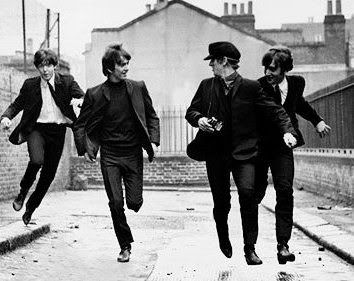Opening scene.
Being one of the more truly
divisive films that have since become cult classics, "Scorpio Rising"
has always been a curiosity for me, despite of its slightly icky homosexual
theme. Indeed, after watching the film in its 28-minute entirety, I can
definitely see where numerous film enthusiasts are coming from when they hail
the film as an influential piece of underground cinema. Sure, with its
psychedelic amalgamation of religious iconography, Nazism and the rising
'rebel' culture of the '60s, "Scorpio Rising" is quite effective in
terms of pushing forth a distorted state of mind. But for me, the film lacks
the ultimate gut-punch, which Kenneth Anger, its director, could have easily
pulled off, especially with the often understated power of terseness on his
side.
As an experimental film, the
film surely has some intriguing moments (the church scene is one of those), but
ultimately, I was left quite unsure about the film's focus and where it truly
resides. Yes, it is a given that Kenneth Anger is seemingly trying to assert
the fact that riders consider their hobby as nothing short of a religion just
like how Christians herald Christianity and Nazis highly regard Nazism. But
hell, I haven't felt the sense of cohesion needed for such a potentially
compelling commentary on hobbyist obsession. And why add the fictitious aspect
of homosexuality in the film? For me, whatever the context of this aspect may
be, I think it was just injected so that, you know, the film can take on a new
layer of pseudo-complexity.
Constructively speaking,
instead of making the film a befuddling experimental/mood piece just like what
it is, Anger could have potentially made "Scorpio Rising" a
full-fledged anthropological film about the motorists' alternative lifestyle
and whether or not they can bode well with the fabric of mainstream Americana.
With that, I think the film could have easily expressed what "Easy
Rider" has powerfully done so just 5 years after it. I did enjoy the
soundtrack, though. Honestly, I could listen to the songs at any given time.
At the end of the day, it's quite
easy to see the film's encompassing visual influence on other filmmakers,
notably Martin Scorsese and David Lynch. But what is quite difficult now to
make sense of is why the film is considered 'great'. If you remove the stock
footage from "The Living Bible: Last Journey to Jerusalem" short and
half of the film's music, what we're merely left with is a plodding little film
that has its sights on nothing but tires and leather boots and its destination
to nowhere but the directionless path to pretense.
FINAL RATING







